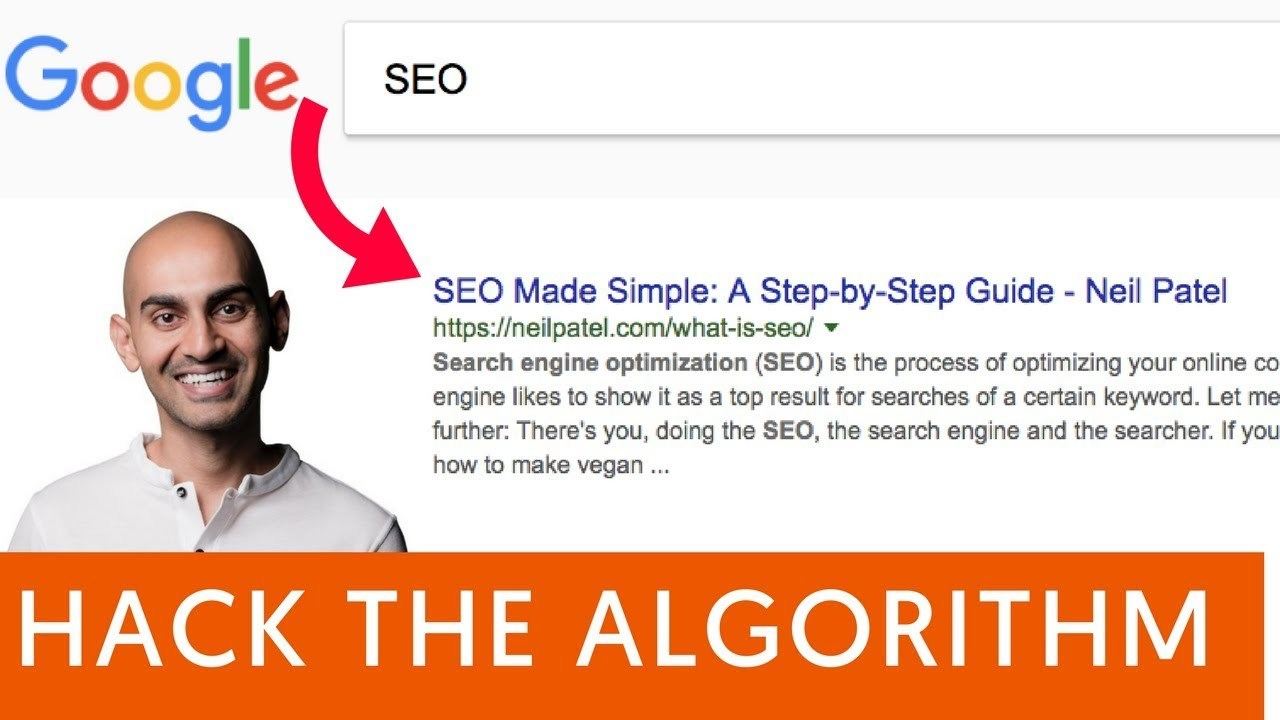
Try it, google "SEO" and you'll see that NeilPatel.com is ranked on Google's first page. How'd I do it? Watch this video: ►►Subscribe here to learn more of my secret SEO tips:
Find me on Facebook:
Read more on my blog:
I'm going to let you in on a little secret, but you have to make a promise to me.
You can't use this against me.
I rank for the most competitive term on Google, on page one.
You know what that term is?
SEO, I'm competing with other marketers who know what they're doing. That's harder than just competing with other companies.
I'm competing with companies with money that know what they're doing. And I'm on page one for the term SEO.
And I'm going to show you the exact steps I took to rank there, but again, you have to promise not to use this for that term so that you would outrank me.
#1: Your content needs to be super-detailed and thorough
If it's not thorough, like pillar content.
What I mean by pillar content is, that one piece of content that pretty much explains everything out there under the sun for that one topic. You know what the number-one result for SEO is?
It's Moz; it's The Beginner's Guide to SEO.
It's long, and it discusses everything about SEO, from how to do it, what it's about, how it got started, every little thing and every tactic or formula that Google's looking at to rank a site.
Now, my content doesn't rank us high, but if you notice, the content on Neil Patel isn't as thorough.
And you don't have to be as thorough, but it just shows, the more detailed you are, the better off you're going to be in rankings.
#2: Your content needs to be beautiful
The better-designed and the more beautiful it is, the better-off you are. People don't like looking at ugly stuff.
I don't like looking at ugly web pages.
No one else does either. Make sure your stuff is really pretty.
#3: It has to load fast.
If it doesn't load fast, it's not gonna work for most people, especially on their mobile phones.
They're pulling out their mobile phone, they're like, oh, this is taking forever to load.
More than 50% of the people using Google are on their mobile phone or mobile device.
So make sure your site loads fast, and especially that webpage that you're trying to rank.
#4: After you do that, cross-link that post or that pillar page on every other page on your website.
If you go to Neil Patel and you go to any single blog post, you'll notice that I link to my SEO article.
It's providing more juice; it's telling Google, hey, I'm linking to this article on every single page for a reason.
It's important; I find it important, I want users to know it's important.
They're clicking on it; you should rank it high up as well.
#5
The next thing you need to do is use Ahrefs.
Go, type in your competitor URLs, and see who links to them. Hit up all of those people and ask them for a link.
For example, you can send them a short email saying,
"Hey John, I noticed you're linking to X, Y, and Z site. I have a similar article that came out, but mine covers one, two, and three that their article didn't. Feel free to check it out here, and if you like it, link to it. Cheers, Neil."
And leaving an email like that to other people leave to your competitors will cause more links back to you. If you send 100 of those, you should get roughly five people linking back to you.
If you don't get five linking back to you, that means the email you're sending is too irrelevant people that shouldn't be linking to you in the first place.
#6
The next thing you'll want to do is, be patient. You're not going to rank right away. That page, after it was put up, it took a year and a half before it popped onto the first page.
You have to be patient and continually update it, provide more value, make it prettier design.
But as long as you're keeping everything up-to-date and you're patient, eventually you'll notice that your rankings will climb.
Mine went from being in the top thousand to top hundred to page five, to page four, to three, to two, and eventually page one.
It was a slow, gradual build.
#7
And here's the last tip for you, and this is what most people don't tell you when it comes to ranking.
If you have two sites, General Motors and BMW, they both have a lot of links, they both have billions of dollars to spend on SEO and marketing. So how does Google know which one to rank higher for car-related terms?
It's brand-related.
If Google noticed that more people are searching for BMW over General Motors, what are they going to do?
They're going to start ranking BMW higher because they have a bigger brand.
